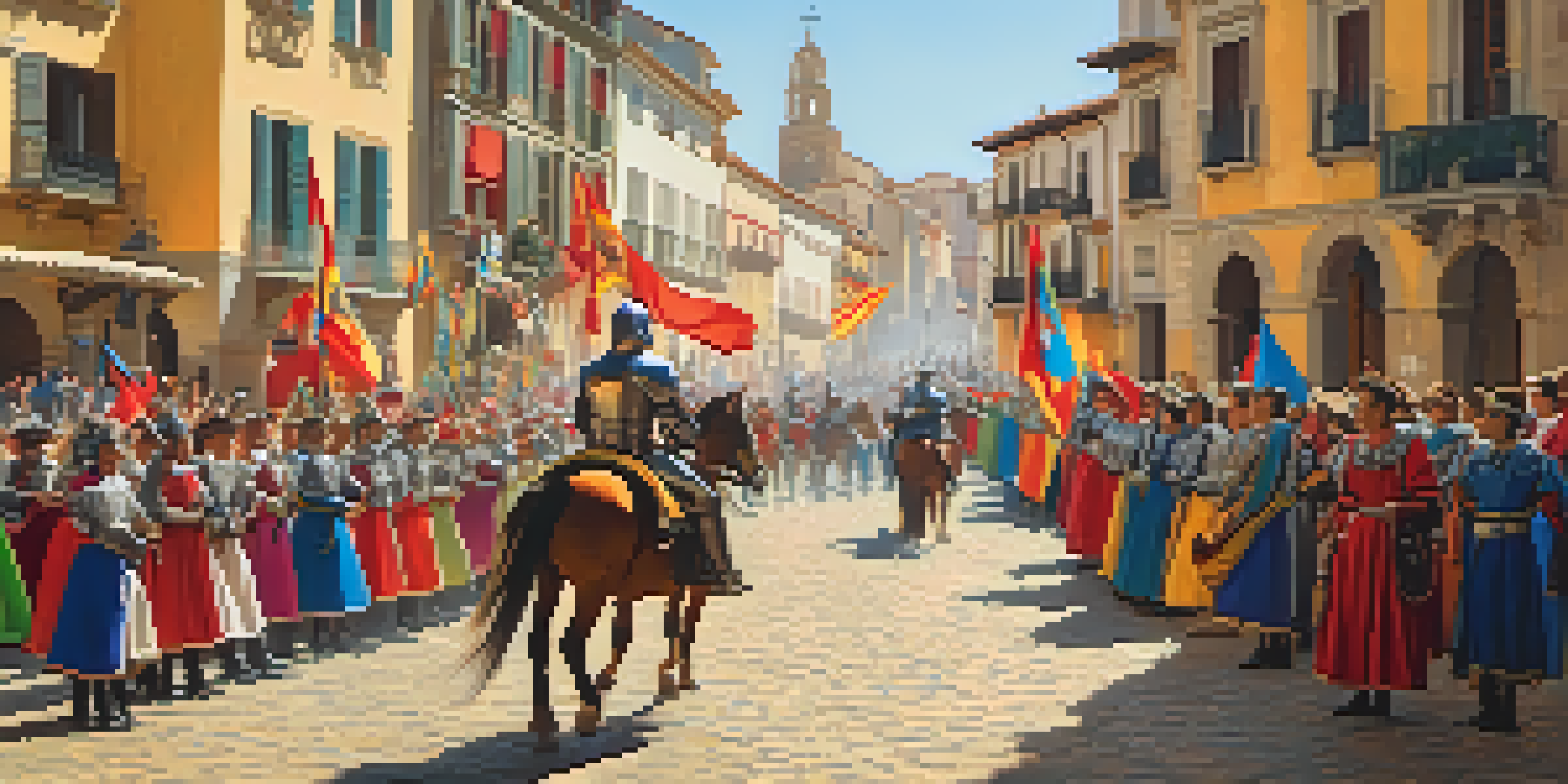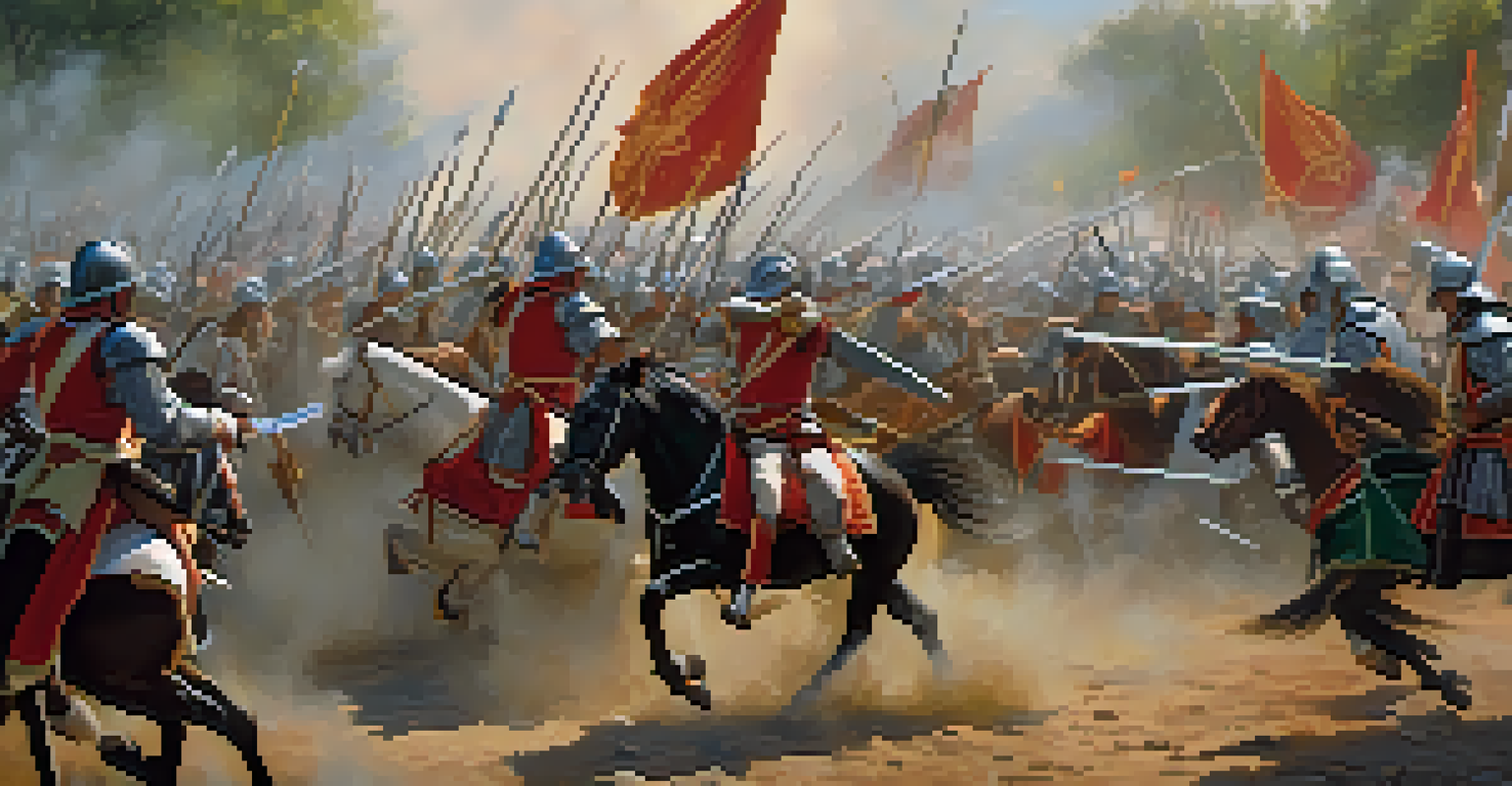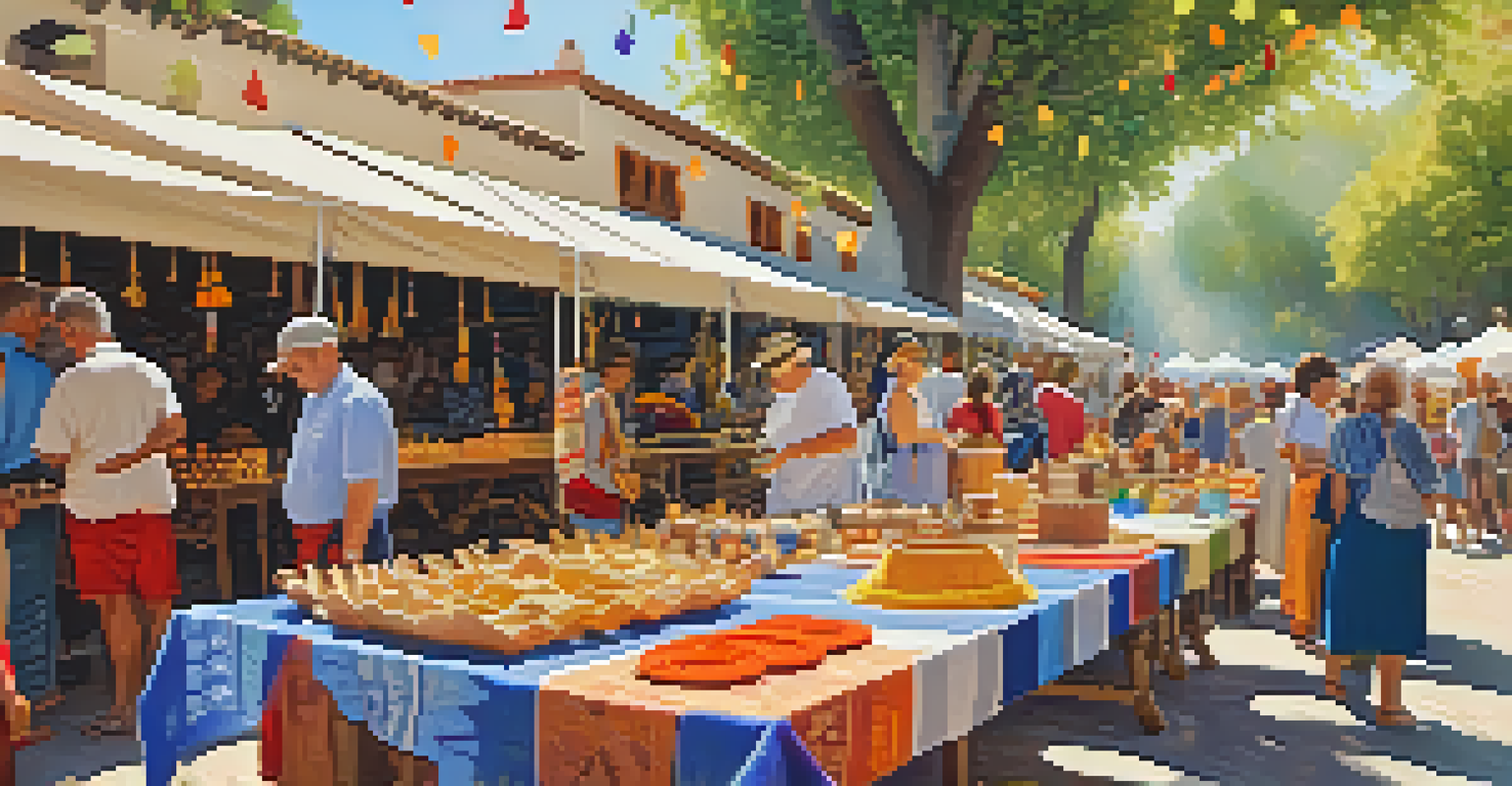Exploring Spain’s Reconquista Festivals through Historical Reenactments

Understanding the Reconquista: A Historical Context
The Reconquista refers to the centuries-long effort by Christian kingdoms to reclaim the Iberian Peninsula from Muslim rule, culminating in 1492. This period was marked by significant cultural and religious clashes, shaping modern Spanish identity. Understanding this backdrop is key to appreciating the festivals that commemorate these historical events.
History is not a burden on the memory but an illumination of the soul.
As you explore the vibrant celebrations today, you’ll notice how they not only honor the past but also reflect the diverse influences that have shaped Spain. From medieval battles to the blending of Christian and Moorish traditions, the Reconquista encapsulates a rich tapestry of history. These elements are vividly brought to life during the reenactments.
By delving into the history of the Reconquista, we gain insights into the motivations behind the festivals. They serve not just as entertainment but as a way to keep alive the stories of bravery, conflict, and cultural exchange that define this significant era in Spanish history.
The Significance of Festivals in Spanish Culture
Festivals in Spain are more than mere celebrations; they are a vital part of the cultural fabric. They offer communities a chance to come together, honor traditions, and express their identity. The Reconquista festivals stand out as a unique way to engage with a pivotal moment in the nation’s history.

These events often feature colorful parades, traditional music, and, of course, reenactments of crucial battles. Participants, dressed in period costumes, reenact scenes that transport attendees back to the 15th century, allowing them to experience the drama and excitement firsthand. This immersive approach keeps history alive and relevant.
Reconquista Festivals Celebrate History
These festivals not only honor the historical significance of the Reconquista but also bring communities together through vibrant celebrations.
Moreover, these festivals foster a sense of pride and continuity among locals. They serve as an opportunity for younger generations to connect with their heritage, ensuring that the stories of their ancestors are not forgotten. This dynamic blend of celebration and education is what makes these festivals truly special.
Key Festivals Celebrating the Reconquista
Several festivals across Spain commemorate the Reconquista, each with its unique flair. One of the most notable is the Fiesta de San Isidro in Madrid, celebrating the patron saint of the city with a blend of religious observance and historical reenactments. It's a vibrant showcase of devotion and cultural pride.
We are not makers of history. We are made by history.
In Toledo, the Festival of the Reconquest features dramatic reenactments of the city's liberation from Moorish control. This festival not only draws locals but also tourists eager to witness the colorful displays of history. The atmosphere is electric, filled with music, dance, and the palpable excitement of community spirit.
Similarly, the Battle of Las Navas de Tolosa festival in Andalusia draws attention for its grand scale. Participants recreate this pivotal battle, which marked a turning point in the Reconquista. These events not only entertain but also educate attendees about the historical significance of the battles fought in their own backyards.
Reenactments: Bringing History to Life
At the heart of these festivals are the reenactments, which serve as the main attraction. Participants immerse themselves in the roles of knights, soldiers, and civilians, bringing the stories of the past to life through performances. This hands-on approach allows spectators to witness history in an engaging and interactive way.
Reenactments often involve meticulously researched costumes and weaponry, adding authenticity to the performances. Participants train rigorously to ensure that their portrayals reflect the realities of the time, making the experience both educational and entertaining. This dedication helps to foster a deeper appreciation for the historical context.
Reenactments Make History Engaging
Through meticulously planned reenactments, participants and attendees experience the drama of the Reconquista era in an interactive and educational way.
Moreover, these reenactments often spark conversations about the complexities of Spain's past. They challenge participants and audiences alike to consider the implications of historical events on contemporary society. Such discussions enrich the festival experience, making it not only a celebration but also a platform for reflection and dialogue.
Cultural Exchange and Community Involvement
One of the most beautiful aspects of the Reconquista festivals is their ability to promote cultural exchange. People from diverse backgrounds come together to celebrate a shared history, fostering understanding and camaraderie. This inclusivity enriches the festival atmosphere, making it a truly communal experience.
Local artisans often showcase their crafts during these events, from traditional food to handmade goods, further emphasizing the importance of community involvement. Attendees can sample local delicacies, learn about traditional crafts, and even participate in workshops. This hands-on engagement creates lasting memories and connections.
As communities band together to organize and execute these festivals, a sense of pride emerges. Volunteers play crucial roles, from planning to performing, demonstrating how collective efforts can lead to vibrant celebrations. This unity is a testament to the enduring spirit of the Spanish people and their commitment to honoring their history.
The Role of Education in Festival Activities
Education plays a pivotal role in the Reconquista festivals, often woven into the fabric of the celebrations. Many events include workshops, lectures, and guided tours that delve into the historical significance of the period. These educational components help attendees of all ages grasp the complexities of the Reconquista.
Schools and local organizations frequently collaborate to create programs that engage students. Through interactive activities, children learn about their heritage and the importance of preserving history. This educational approach ensures that the stories of the past are passed down to future generations.
Cultural Exchange Enhances Community
The festivals promote cultural exchange and community involvement, showcasing local artisans and fostering camaraderie among diverse groups.
By incorporating educational elements, festivals become more than just entertainment; they transform into valuable learning experiences. Attendees leave with a greater understanding of Spain's history, fostering a sense of responsibility to keep these narratives alive. It's a beautiful blend of celebration and scholarship.
Conclusion: Celebrating Heritage Through Festivals
In conclusion, Spain's Reconquista festivals are a vibrant celebration of history, culture, and community. They offer a unique opportunity to engage with the past while fostering connections among diverse groups. The reenactments, educational activities, and communal spirit create an atmosphere that is both festive and meaningful.
These festivals remind us of the importance of remembering our history, as it shapes our identity and informs our future. By participating in these events, we honor the struggles and triumphs of those who came before us. It's a powerful way to celebrate heritage and promote understanding.

As you explore these festivals, immerse yourself in the stories they tell. Whether you’re a local or a visitor, there’s something truly special about experiencing history in such a lively and engaging manner. So, grab your costume and join the festivities—you’ll walk away with a deeper appreciation for Spain's rich and diverse heritage.